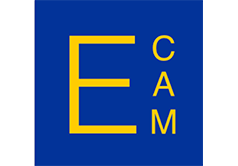The recently launched project titled European eXtreme Data and Computing Initiative (EXDCI) aims to coordinate the development and implementation of a common strategy for the European HPC ecosystem. Started in October 1st, this initiative is managed by PRACE and ETP4HPC. The idea of EXDCI is to gather in various activities such as events or workshops the different collaboration among the key players in the HPC ecosystem: the Centres of Excellence (CoEs) and the FETHPC projects. The next event hosted by EXDCI will be the European HPC Summit which will be held from 9 to 13 May in Prague, Czech Republic.
Centres of Excellence in HPC Applications
Eight new Centres of Excellence (CoEs) for computing applications were selected following the recent EC call under e-Infrastructures. They will help strengthen Europe's leadership in HPC applications and cover important areas like renewable energy, materials modelling and design, molecular and atomic modelling, climate change, Global System science, and bio-molecular research, and tools to improve the performance of HPC applications.
A short description of each CoE can be found here:

BioExcel
The European Centre of Excellence for Bimolecular Research (BioExcel) is operating towards advancement and support of the HPC software ecosystem in the life science domain. Research and expertise covers structural and functional studies of the main building blocks of living organisms (proteins, DNA, membranes etc.) and techniques for modelling their interactions ranging from quantum to coarse-grained models up to the level of a single cell. Work in the centre is focused on 1) improving the performance and scalability of major simulation packages for more efficient usage of HPC resources, 2) improving the usability of existing and devising new workflows and environments with associated data integration, 3) competence-building among both academia and industry through extensive training programs and promotion of best practices. The CoE consortium is dedicated to establishing the centre as a long-term support structure for the needs of academic/non-profit and industrial users (pharmaceutical, chemical and food industries); ISVs and academic code developers; national and commercial resource providers.

CoeGSS - Center of Excellence for Global Systems Science
The evaluation, assessment and forecast of social, economic and ecological developments forms the basis of the Center of Excellence for Global Systems Science (CoeGSS). In order to understand and improve global analyses and evaluations in a more efficient way, the CoeGSS project builds on synthetic populations that reflect the behaviour of the human mankind. Based on static degrees of relationships and the social as well as health habits, an anonymized population dataset including millions or even billions of people will be created. As most of the time, various factors and relations need to be taken into account, the datasets grow drastically and therefore require HPC and in addition, High Performance Data Analytics (HPDA). Thus, bridging the gap between those two paradigms will be one of the key findings of the project.

E-CAM
Directed at industrial and academic users across Europe and beyond, the E-CAM centre of excellence will develop over 150 robust software modules and associated software standards required for the simulation of materials, including biological systems, advanced food for health, and pharmaceuticals as well as solid state devices and polymers. It will identify the needs of its industrial partners and build appropriate consultancy services. It will directly hire and train some 30 postdoctoral researchers and advanced programmers, and will indirectly train many more, including professional development courses for scientists working in industry. In all this it will seek to challenge the stereotypes of status and gender associated with high-performance computing. Together with other initiatives funded as part of the European digital agenda it will work to increase the uptake of advanced computational simulation methods in industry and in research.

EoCoE
The Energy Oriented Center of Excellence (EoCoE) will use the prodigious potential offered by the ever-growing computing infrastructure to foster and accelerate the European transition to a reliable and low carbon energy supply. EoCoE will assist the energy transition via targeted support to four carbon-free energy pillars: Meteorology, Materials, Water and Fusion, each with a heavy reliance on numerical modeling.
These four pillars will be anchored within a strong transversal multidisciplinary basis providing high-end expertise in applied mathematics and HPC.

ESiWACE
The Center of Excellence in Simulation of Weather and Climate in Europe (ESiWACE) will substantially improve efficiency and productivity of numerical weather and climate simulation on HPC platforms by supporting the end-to-end workflows in global Earth system modelling for top-of-the-edge HPC environments. This will be obtained by improving and supporting: scalability of models, tools and data management on state-of-the-art supercomputer systems; usability of models and tools throughout the European HPC ecosystem; exploitability of the huge amount of resulting data. By developing solutions for Europe and at European scale, ESiWACE will directly impact on the competitiveness of the European HPC industry by engendering new products, providing opportunities for exploitation beyond the project itself, and by enhancing the skills base of staff in both industry and academia. ESiWACE will be at once thematic, as it focuses on the HPC application domain of climate and weather modeling, transversal, as it covers several aspects of computational science, and challenge-driven, as climate and weather predictability represents a major societal issue.

MaX
The Materials design at Exascale (MaX) center of excellence aims to disenthrall the EU leadership in materials modelling, simulations, discovery and design. Materials are crucial to scientific and technological change and industrial competitiveness, as well as to tackle key societal challenges – from energy and environment, to health care, information and communications, industrial processes and manufacturing, safety and transportation. The increasingly high accuracy and predictive power of computer simulations, combined with the increasingly higher levels of computing and storage capacity of HPC technologies, nowadays enables a paradigm shift in material design and discovery, in which ever increasingly complex material behaviour will be addressed by easily accessible, interdisciplinary, easy-to-use computational experiments. To drive this transition, MaX focuses on creating an ecosystem of capabilities, software applications and data workflows and analysis on HPC-oriented material simulations, designed for present and future HPC architectures. A major effort is on providing training and services for the broader HPC industrial and academic community. Over the next decade HPC systems are expected to be capable of one exaflop (1018 operations per second) and to manage and analyse data sets up to one exabyte (1018 bytes). Imagine a future in which computer simulations are at least 1000 times faster and more workable: new materials, new 3 ideas, new applications will be pushed ahead by an ever-increasing number of scientists, designers and entrepreneurs. ·

NOMAD
Essentially every new commercial product, be they smart phones, solar cells, batteries, transport technology, artificial hips, etc., depends on improved or even novel materials. Computational materials science is increasingly influential as a method to identify such critical materials for both R&D. Enormous amounts of data, precious but heterogeneous and difficult to access or utilise, are already stored in repositories scattered across Europe. The NOMAD CoE will open new HPC opportunities by enabling access to this data and delivering powerful new tools to search, retrieve and analyse it. The NOMAD CoE will become a crucial facility for atomistic simulations and multi-scale modelling in the physical, materials, and quantum-chemical sciences. This field is characterised by a healthy but heterogeneous eco-system of many different codes that are used at all HPC centers worldwide, with millions of CPU hours spent every day. The NOMAD CoE will integrate the leading codes and make their results comparable by converting (and compressing) existing inputs and outputs into a common format, thus making these valuable data accessible to academia and industry. To facilitate efficient use of such valuable data, the NOMAD CoE will develop a materials encyclopedia and big-data analytics for materials science.

POP
The Performance Optimization and Productivity (POP) Center of Excellence gathers leading experts in performance tools/analysis and programming models to offer services to the academic and industrial communities to help them better understand the behavior of their applications, suggest the most productive directions for optimizing the performance of the codes and help implementing those transformations in the most productive way. The consortium includes academic and supercomputing centers with a long track record of world class research as well as service companies and associations with leading experience in high performance support services and promotion.